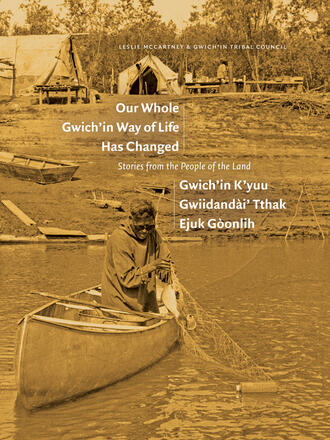
Our Whole Gwich’in Way of Life Has Changed / Gwich’in K’yuu Gwiidandài’ Tthak Ejuk Gòonlih
Stories from the People of the Land
Life-stories of 23 Gwich’in Elders from the Northwest Territories in Canada speak to changing times.
La description
These life stories of 23 Gwich’in Elders from the Northwest Territories communities of Fort McPherson, Tsiigehtshik, Inuvik, and Aklavik are an invaluable compilation of historical and cultural information. Their distinctive voices speak to their values, world views, and cultural assumptions, while McCartney assists by providing context and background on the lives of the narrators and their communities. All those interested in Canadian/Northern history, anthropology, Indigenous Studies, oral history, or cultural geography will benefit from this critical resource.
Récompenses
- Winner, AUPresses Book, Jacket, & Journal Show - Scholarly Typographic 2021
- Winner, Oral History Association Book Award 2021
- Commended, Choice Outstanding Academic Title 2021
- Commended, Labrecque-Lee Book Prize 2021
- Winner, Scholarly and Academic Book of the Year | Alberta Book Publishing Awards, Book Publishers Association of Alberta 2021
Reviews
"[Elders] recall the sound of sled dogs galloping through the snow, the blue gleam of moonlight in winter and smell of fresh caribou steaks drying on spruce boughs…. Their stories are chronicled in Our Whole Gwich’in Way of Life Has Changed, a big, beautiful volume. It is warm and human. " [Full article at https://www. blacklocks. ca/review-moonlight-and-fresh-caribou/]
- Holly Doan
“I can easily anticipate that this book will be used in an education setting by the nation…. It will also be of interest to anyone interested in the Gwich’in nation, Gwich’in history, and colonialism in the Arctic. Given the rapid pace of change in the last century or so, quite often the histories provided by the Elders document a huge part of the history of colonization in the North, with many of the Elders in question being amongst the last generations to live for at least part of their life without significant outside influence or change. ” [Full article at https://ormsbyreview. com/2021/04/05/1086-sims-mccartney-gwichin/]
- Daniel Sims
"Our Whole Gwich’in Way of Life Has Changed is a remarkable collection of oral history and anthropology that should find a ready audience for anyone interested in Indigenous peoples, particularly those located in Arctic Canada.... The reader comes away from each chapter feeling newly connected to the storyteller and to the Gwich’in community. It is meticulously well documented.... Front- and back-end appendixes and materials provide a beautiful introduction and rich context for the reader... Highly recommended. All levels." G. Christensen, CHOICE Magazine, December 2021
"In crafting each Elder's narrative--working from oral recordings to written English--McCartney chose to use an 'impressionist approach' in which the writing focus is on the researcher as storyteller, thus allowing the author (McCartney) to provide contextual information in a story format along with detailed descriptions in the Elder's own words. While necessarily several steps removed from the voices of individual Elders, I found this technique effective in unifying the text for a broad and varied audience.... Readers like myself unfamiliar with the Gwich'in homeland are given clear guides to the rich history of the Gwich'in world. And Gwich'in readers, both young and old, are presented with an accessible account of twentieth century life along the Peel River, Arctic Red River, and lower MacKenzie River." Ann Fienup-Riordan, Alaska History, Fall 2021
"Cette magnifique contribution, presque encyclopédique, qui saura très certainement capter l’intérêt de nombreux anthropologues ainsi que des chercheurs d’autres domaines des sciences sociales, constitue dans le même temps un superbe et poignant hommage à la mémoire des aînés gwich’in — dont seulement deux parmi ceux qui ont participé sont encore en vie au moment de la parution de l’ouvrage —, à l’attachement qu’ils portent à leur territoire, aux drames et aux joies qu’ils ont vécus." Paul Bénézet, Anthropologie et Sociétés, Vol. 46, No 2, 2022
“… this collection makes a significant contribution to our understanding of Dinjii Zhuh histories, the methodology of oral histories, and Indigenous engagement in scholarly research…. [The] scholarship used and modeled in Gwich’in K’yuu Gwiidan-dài’ Tthak Ejuk Gòonlih charts an innovative, ethical, and respectful path for Indigenous research.... In this timeless piece, McCartney and the GTC have centered and elevated the words of our Elders in a way that remains unmatched in today’s scholarship on northern Canada.” Crystal Gail Fraser, NAIS, Spring 2023
"This book captures the joys and struggles of individual Gwich'in women and men who came of age in the first decades of the twentieth century. Their stories convey, with great emotion and poignancy, the extraordinary corpus of skills and knowledge required in not only surviving but thriving in a northern environment."
- Robert Jarvenpa, Professor Emeritus of Anthropology, SUNY Albany
"This book is a valuable and important collection of Gwich’in Elders’ life stories that adds much to the growing literature focused on Indigenous narratives, rarely heard in Canada."
- Thomas D. Andrews, Adjunct Professor, Department of Archaeology and Anthropology, University of Saskatchewan